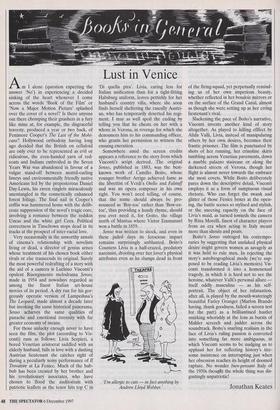Lust in Venice
Am I alone (question expecting the answer 'No') in experiencing a decided sinking of the heart whenever I come across the words 'Book of the Film' or `Now a Major Motion Picture' splashed over the cover of a novel? Is there anyone out there chomping their gnashers in a fury like mine at, for example, the disgraceful travesty, produced a year or two back, of Fenimore Cooper's The Last of the Mohi- cans? Hollywood orthodoxy having long ago decided that the British on celluloid are only ever to be represented as evil or ridiculous, the even-handed yarn of red- coats and Indians embroiled in the Seven Years War was abandoned in favour of a vulgar stand-off between nostril-curling limeys and environmentally friendly native Americans led by the preposterous Daniel Day-Lewis, his raven ringlets miraculously unentangled in the cosmetically enhanced forest foliage. The final nail in Cooper's coffin was hammered home with the delib- erate suppression of the novel's tragic core, involving a romance between the redskin Uncas and the white girl Cora. Political correctness in Tinseltown stops dead in its tracks at the prospect of inter-racial love.
Very occasionally in the unworthy annals of cinema's relationship with novelists living or dead, a director of genius arises whose treatment of his chosen book either rivals or else transcends its original. Surely the most powerful redrafting of a story with the aid of a camera is Luchino Visconti's opulent Risorgimento melodrama Sense, made in 1954 and nowadays regarded as among the finest Italian art-house movies of its period. A dry run for his gor- geously operatic version of Lampedusa's The Leopard, made almost a decade later but invoking the same historical panorama, Senso achieves the same qualities of panache and emotional intensity with far greater economy of means.
For those unlucky enough never to have seen the film, the plot (according to Vis- conti) runs as follows: Livia Serpieri, a bored Venetian aristocrat saddled with an elderly husband, falls in love with a dashing Austrian lieutenant she catches sight of during a peculiarly noisy performance of Il Trovatore at La Fenice. Much of the hub- bub has been created by her brother and his revolutionary associates, who have chosen to flood the auditorium with patriotic leaflets as the tenor hits top C in `Di quella pira'. Livia, caring less for Italian unification than for a tight-fitting Habsburg uniform, leaves pettishly for her husband's country villa, where she soon finds herself sheltering the rascally Austri- an, who has temporarily deserted his regi- ment. I may as well spoil the ending by telling you that he cheats on her with a whore in Verona, in revenge for which she denounces him to his commanding officer, who grants her permission to witness the ensuing execution.
Somewhere amid the screen credits appears a reference to the story from which Visconti's script derived. The original Senso, published in 1883, was the best- known work of Camillo Boito, whose younger brother Arrigo achieved fame as the librettist of Verdi's Otello and Falstaff and was an opera composer in his own right. You won't need telling, of course, that the name should always be pro- nounced as 'Boy-toe' rather than 'Bow-ee- toe', thus providing a handy rhyme, should you ever need it, for Goito, the village north of Mantua where Victor Emmanuel won a battle in 1859.
Senso was written to shock, and even in these jaded days its ferocious impact remains surprisingly unblunted. Boito's Countess Livia is a half-crazed, predatory narcissist, drooling over her lover's physical attributes even as he slumps dead in front `I'm allergic to cats — in fact anything by Andrew Lloyd Webber.' of the firing-squad, yet perpetually remind- ing us of her own imperious beauty, whether reflected in her boudoir mirrors or on the surface of the Grand Canal, almost as though she were setting up as her erring lieutenant's rival.
Slackening the pace of Boito's narrative, Visconti invents another kind of story altogether. As played to killing efffect by Alida Valli, Livia, instead of manipulating others by her own desires, becomes their frantic prisoner. The film is punctuated by shots of her running, her crinoline skirts tumbling across Venetian pavements, down a marble palazzo staircase or along the darkened streets of Verona, though her flight is almost never towards the embrace she most covets. While Boito deliberately pares down the descriptive detail, Visconti employs it as a form of sumptuous visual rhetoric. Who can forget the swank and glitter of those Fenice boxes at the open- ing, the battle scenes so stylised and stylish, or the sneering rapacity on the face of Livia's maid, as turned towards the camera by Rina Morelli, finest of character players from an era when acting in Italy meant more than shouts and pouts.
Boito's Senso outraged his contempo- raries by suggesting that unslaked physical desire might govern women as savagely as it was held to rule men. In rejecting the story's autobiographical mode (we're sup- posed to be reading Livia's memoirs) Vis- conti transformed it into a homosexual tragedy, in which it is hard not to see the heroine, whatever Valli's personal allure — itself oddly masculine — as his self- portrait. The object of her infatuation, after all, is played by the mouth-wateringly beautiful Farley Granger (Marlon Brando having, thank goodness, failed a screen test for the part) as a brilliantined hustler smirking whorishly at the lens as bursts of Mahler screech and judder across the soundtrack. Boito's snarling realisim in the face of Livia's ruling passion is converted into something far more ambiguous, in which Visconti seems to be nudging us to applaud her for reflecting history's tire- some insistence on interrupting just when her obsession reaches its height of doomed rapture. No wonder bien-pensant Italy of the 1950s thought the whole thing was dis- gustingly unpatriotic!
Jonathan Keates


















































































 Previous page
Previous page